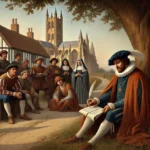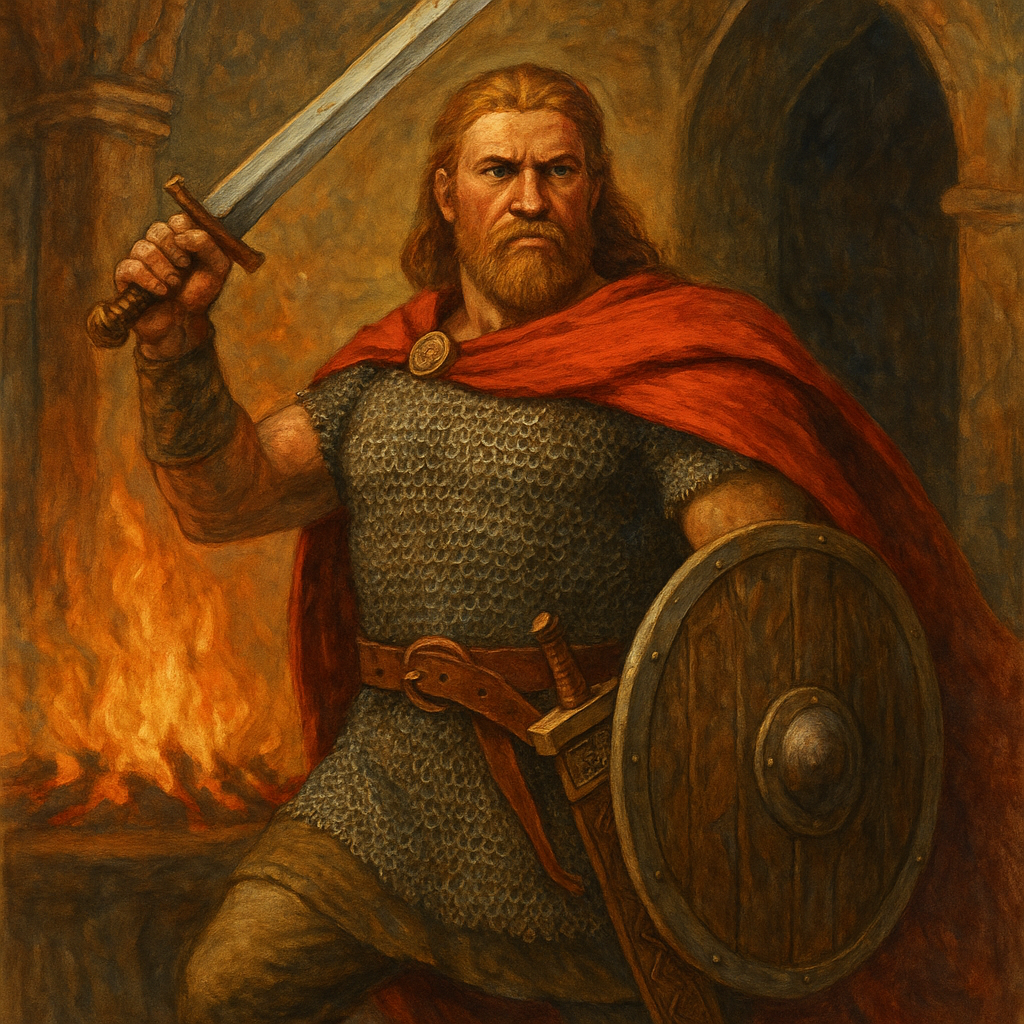By ABS, The Literary Scholar Because before Thor had a hammer, Beowulf had a bare chest and a cause
Before Superheroes, There Was a Geat
Centuries before Hollywood gave us muscle-bound men in capes and billionaires with trauma-fueled tech suits, a poet in a smoky Anglo-Saxon mead hall was chanting the tale of Beowulf—a warrior who didn’t just slay monsters… he became a legend.
“Fate goes ever as fate must.” — Beowulf
This wasn’t just poetry. It was myth-making. A man with superhuman strength, unwavering loyalty, and no interest in subtlety.
Beowulf didn’t brood. He didn’t glow.
He ripped off a monster’s arm with his bare hands.
So let’s raise the literary curtain, shine a spotlight on this ancient epic, and answer the real question:
Is Beowulf the original fantasy-action hero?
Spoiler: Absolutely. And Marvel owes him a thank you card.
I. A Quick Recap (For Those Who Didn’t Read It in School)
Beowulf is a heroic epic poem written in Old English—sometime between the 8th and 11th century.
It survives in a single manuscript: the Nowell Codex, currently housed in the British Library.
Set in Scandinavia, not England, the poem follows our main man, Beowulf, a warrior of the Geats, who:
Travels to Denmark to help King Hrothgar, whose great hall (Heorot) is being terrorized by a monster named Grendel
Fights Grendel with his bare hands, kills him
Then kills Grendel’s angry mother underwater in a sword-slashing battle
Becomes king of the Geats and rules peacefully for 50 years
Then, in old age, fights a fire-breathing dragon
Dies heroically… because of course he does
It’s a tale of courage, legacy, and doom—with a monster count that could rival any fantasy franchise.
II. Why Beowulf Was Basically the First Avenger
Let’s break it down:
| Beowulf | Modern Superhero Tropes |
|---|---|
| Unmatched strength | Hulk, Superman |
| Fights for others’ safety | Captain America |
| Enters a land in distress | Classic hero’s journey |
| Battles monsters, dragons | Fantasy staples from Game of Thrones to The Witcher |
| Dies nobly in the final battle | Iron Man, anyone? |
If Beowulf had a cinematic universe, it would include:
A dark, brooding backstory (he does have a bit of this)
A mysterious prophecy (there’s lots of fate talk)
And a killer soundtrack (cue deep drums and Viking choirs)
III. Grendel, the Mother, and the Dragon: Villains with Vibes
In a world filled with gods and beasts, Beowulf’s monsters were metaphors wrapped in muscle.
Grendel: The outsider, the “other,” perhaps born of Cain. He hates joy, hates noise, hates humans. Basically, a hater with claws.
Grendel’s Mother: Vengeful, strong, and complex. (Honestly, one of the most compelling female monsters in lit.)
The Dragon: Greedy, destructive, symbolic of inevitable death—Beowulf’s final test.
These aren’t just beasts. They’re psychological projections—fear of the unknown, of maternal wrath, of aging and decay.
“He knew his days were numbered.”
Even Beowulf, the beast-slayer, couldn’t beat time.
IV. From Oral Epic to Hollywood Adaptation
Beowulf has had a cinematic journey more dramatic than the poem itself:
2007’s Beowulf (dir. Robert Zemeckis): A motion-capture epic featuring a naked, shiny Beowulf voiced by Ray Winstone and Angelina Jolie as a seductive Grendel’s Mother.
Reviews? Mixed. Interpretations? Wild.The 1999 film The 13th Warrior (loosely inspired by Beowulf): Antonio Banderas with swords, fog, and Norse vibes.
Countless reimaginings in comics, anime, theatre, video games (God of War, anyone?), and even children’s books.
Because Beowulf, like every great myth, transcends time.
He is part Batman, part Odysseus, and part Viking influencer.
V. Why the Story Still Works Today
We still need heroes.
Not perfect ones, but flawed, brave, sacrificial figures who stand between us and chaos.
Beowulf isn’t ironic. He doesn’t wink at the camera.
He believes in honor, reputation, loyalty, and the hard choice—even when it kills him.
“Let him who can win fame before death do so.”
(Because Twitter likes don’t last. Deeds do.)
Beowulf’s story resonates because:
We still face monsters (psychological, societal, personal)
We still admire those who act bravely without reward
We still want to believe in something larger than ourselves
VI. Fantasy Before Fantasy Had a Label
This was pre-Tolkien, pre-Dungeons & Dragons, pre-everything.
And yet:
Beowulf fights creatures in caves
Battles with mythic swords
Wears heroic armor
Faces dragons sleeping on treasure
Sound familiar?
Tolkien, in fact, was a huge Beowulf nerd.
He even said that without Beowulf, there would be no Hobbit and no Middle-earth.
“Beowulf is among my most valued sources…” — J.R.R. Tolkien
So when we read Beowulf, we’re stepping into the first fantasy realm, paved with poetic devices and dripping in doom.
VII. Beowulf: A Hero for Our Times
Beowulf dies at the end.
But his legacy lives, because he stood up when no one else would.
In a world that celebrates irony, Beowulf offers sincerity.
In a culture of individualism, Beowulf sacrifices himself for his people.
In an era of escapism, Beowulf reminds us that monsters must be faced, not ignored.
And sometimes, even superheroes need no armor but courage.
Final Scroll: Why This Tale Begins Our Scroll
Because every epic needs an origin.
And British literature, with all its brilliance, begins with a warrior-poet’s voice echoing across firelight.
Beowulf was there before Shakespeare, before Chaucer, before TikTok made book recaps cool.
He is the first roar in English poetry.
And maybe—just maybe—still the loudest.
So grab your metaphorical sword. The scroll begins here.
ABS closes the scroll, nods toward the mist, and disappears into a dragon-shaped silhouette.
Even in fire and fate, the echo of courage remains.
Signed,
ABS, The Literary Scholar
“ABS, The Literary Scholar: The Wife of Bath—reality TV’s original tell-all star

Share this post / Spread the witty word / Let the echo wander / Bookmark the brilliance

